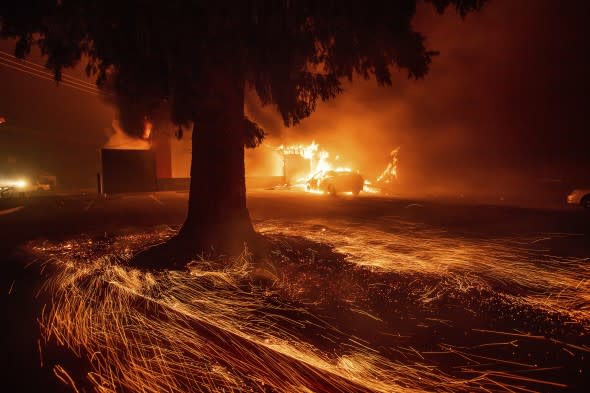What is a Red Flag Warning?
Many people live in a high fire area, so knowing what to do and what not to do when conditions are ideal for a wildfire could be live-saving.
A Red Flag Warning means high temperatures, very low humidity and stronger winds are expected to combine to produce an increased risk of fire danger.
"Red Flag Warnings are issued when humidity is low, and winds are strong. These are the two greatest influences in wildfire spread. Beyond that, the moisture content of vegetation plays a significant role as well, if the 'fire fuels' are dry, after a period of drought, fires can spread faster than if there was recent rainfall obviously," said AccuWeather Broadcast Meteorologist Geoffrey Cornish.
"The idea of the Red Flag Warning is to communicate the fact that the weather conditions present will promote rapid fire growth should a fire form," AccuWeather Senior Meteorologist Dave Samuhel said.
According to Samuhel, there is criteria for the humidity levels based on the region of the country.
"The criteria in the southwest U.S. is usually around 15 percent for relative humidity levels, but is higher, more like 25 to 30 percent, across Georgia and Florida, for example," Samuhel said.

Flames consume a fast food restaurant as the Camp Fire tears through Paradise, Calif., on Thursday, Nov. 8, 2018. The fire incinerated most of a town of about 30,000 people with flames that moved so fast there was nothing firefighters could do, authorities said Friday, Nov. 9, 2018. (AP Photo/Noah Berger)
"Another weather pattern that would spawn a Red Flag Warning is dry lightning, where lightning strikes are expected with little to no rainfall. This is most common across the Western states during the summer months," Samuhel said.
If you are allowed to burn in your area, all burn barrels must be covered with a weighted metal cover, with holes no larger than three-quarters of an inch.
"It doesn't take much wind to factor in, usually anything over 15 mph is adequate as long as the relative humidity is very low," Samuhel said.

Do not throw cigarettes or matches out of a moving vehicle
It's extremely important to properly dispose of cigarette butts for many reasons, one of which is that they may ignite dry grass on the side of the road and trigger a wildfire.
In some places, it is illegal to throw cigarette butts out of your car window.
Avoid open burning
Open burning is any burning conducted in such a way that smoke and other emissions are released directly into the air, rather than filtering through a chimney.
"During a Red Flag Warning, people should avoid doing any open burning. It is dangerous to burn yard debris when the relative humidity is very low and winds are active. Even a stray ember can spark a wildfire that rapidly spreads out of control," Cornish said.
It is also best to avoid or extinguish any campfires.
Extinguish all outdoor fires properly
Drown fires with plenty of water and stir to make sure everything is cold to the touch.
It is best to dunk charcoal in water until cold as well. Do not throw live charcoal on the ground and leave it, because that could easily start a fire, especially during a Red Flag Warning.
Never leave a fire unattended
If there is a fire, watch for sparks or embers because they can blow into leaves or grass, ignite a fire and quickly spread.
It is common for people to go to sleep while a campfire continues to burn; however, that is extremely dangerous because that may start a wildfire.
A wildfire's forward rate of spread speed is generally a maximum of 9 to 12.5 mph.
Don't park cars over dry brush
"What people want to do is be extra careful with anything that could cause a spark. Parking a car over dry grass could trigger a fire for example," Samuhel said.
"People should also avoid parking or idling their vehicle over grass for more than just a brief moment. Vehicles shouldn't be driven over tall grass or vegetation if that can be avoided, as the exhaust system can be so hot that it can ignite the brush upon contact," Cornish said.
According to Cornish, people who live or own property in the woods, especially in drier climates, should always keep a strip of clearing around the perimeter of their home, garage or outbuilding.
"This can offer at least somewhat of a barrier of protection around the building if a wildfire reaches the brush nearby," Cornish said.
